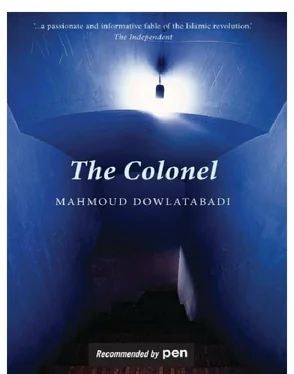
It was only in the final year, before all the prisons were opened anyway and the inmates released, that Amir and the colonel found themselves thrown together. Amir was a political prisoner, accused of ‘endangering national security,’ while the colonel had been found guilty of a string of offences, both political and criminal. His case had been investigated by military counter-intelligence. Only after he had been stripped of his rank, sentenced and automatically cashiered from the army did they transfer him to a political prison. It was there that the colonel found himself next to Amir and got to know his son in a new way, in which Amir was not merely his son, but first and foremost an independent man in his own right, with his own future in front of him.
the colonel had always let his children find their own way in life. He had not even prevented Parvaneh, the youngest of his children, from ploughing her own furrow. But now he could not help but wonder whether the dreadful fate that had overtaken every one of his children was in fact due to his laissez-faire approach. But no, this did not really provide the old man with an easy answer, either. He firmly believed that he had bequeathed to his children only the most natural of rights, namely the right to determine what they wanted to do with their lives. But that did not mean by a long chalk that he had been guilty of teaching them to be irresponsible — none of them could ever be accused of being irresponsible. No, he had done his best to bring up his children and had, perhaps, at times even gone to extremes to control them.
In the end, perhaps the colonel’s wish that his children lead independent lives was a reaction on his part against a life which he felt had been imposed upon him. He felt that he had been short-changed by never having had the freedom to live his own life. This made him feel like some sort of cripple. He felt himself a lesser man for having being forced to live a life under duress and that, until a man takes charge of his own life, he cannot truly know himself. Such a half-baked creature, whether in life or in death, cannot be judged for what he is or was, for he might have become something that he could never even have imagined. the colonel’s firm views on this score made him convinced that he was not the person whom others thought him to be, whom others presumed to pass judgement on. Given this verdict on himself, he certainly was not about to accept other people’s judgements of him without demur. And he would probably never discover who he really was, now that he had burdened himself with a weight of guilt that it would take him thousands of years to wash away.
At least one of you should look out for himself. It’s not as though you were carrying the weight of all history on your shoulders! I’m not as strong as you think I am . That’s what he really wanted to tell his children.

They came and told him that Amir was in prison as well, and showed him a file containing a bloodstained knife.
“A knife? With blood on it? Do you mean Amir has killed someone with it?”
“Yes, colonel. Do you find that hard to believe?”

“Do you recognise this knife?”
Yes, Amir did recognise it. The knife still had blood on it and it had been put right under his nose on a grey metal table. On the opposite side of the table stood not Khezr Javid, but another man, twice the size of a normal man, who kept playing with his false teeth and swaying back and forth. He was tall and square-shouldered, with a slight stoop. He had a big, block head and short grey hair. His eyes were narrow, lifeless and glassy. To Amir, in his fever, he looked like a monster.
Maybe the monster did not intend to frighten Amir but, with his rolled up sleeves, massive scarred and filthy hands, low brow and glassy eyes, and his colossal frame, which almost scraped the ceiling, and the way he kept pushing his false teeth in and out, he was threatening enough. His shoulders were so broad that they seemed to fill the whole room. His whole appearance was quite fearsome enough, to the point of being a joke. Amir felt the man was playing with him. There was no cable whip in his hand; he didn’t need one. But Amir could see one hanging coiled, serpent-like, on the wall. He could hardly breathe and his stomach, swollen and heavy, was pressing up on his chest. He wanted to get a look out of a window or even a skylight, just to get a breath of air and see what time of day it was. But there was no window; the room didn’t seem to have a door, either. It must have had one, but Amir could not make it out. There was just a small shaded lamp, which lit the bench that he had collapsed onto. The monster was in shadow, while the lamp was trained on the bloodstained knife on the metal table, so that Amir could see every detail of it. He thought he could see Mansour Salaami’s fingerprints on its bone handle, but that was probably a figment of his fevered imagination, brought on by torture and terror.
“The knife… I’m asking you, do you recognise it?”
“Yes… I’ve seen it before.”
“When? Was it night-time or daytime? What time was it?”
“I don’t know. I don’t know. I just remember seeing it… That’s all.”
“Where did you see it? Who had it?”
“One of the people working with me. Just a boy.”
“What’s the name of this person working with you?”
The monster seemed to want to give Amir some respite, for he took out a pack of long Winston Golds, lit one, stuck it in the corner of his mouth, sat down on the metal chair next to the table and began to puff away at it. Between each drag, he clicked his false teeth in and out, without averting his obscene, glassy gaze from Amir’s face for even an instant. Amir longed for him to offer him a cigarette. It would have been the best smoke of his life. But it didn’t happen. Amir later understood that an interrogator only offers his victim a cigarette when his subject has cracked and starts talking, and he can start a file. Amir had been broken long since, of course, but he had not had any information to give. The man, that horrifying monster, had smoked his cigarette only halfway down and could easily have offered the rest of it to Amir, to satisfy his killing need for a smoke, but instead he crushed it under his massive foot and started again:
“What’s the name of this person working with you? Give me his name.”
“Mansour Salaami.”
Amir had told him. Without stopping, he went on: “Khamami, Nur-Aqdas Khamami… my wife… why did you arrest her? Just tell me that.”
The monster gave no reply. Amir had thought that if he gave Mansour Salaami away they would reward him by telling him what had happened to his wife, but he got no answer and the man showed no anger. He found out later that the accused is not supposed to ask questions; he is just required to give answers. The reason why the man had not got angry was that he could not make up his mind as to what to do about what he had just heard. He was worried about the person who would see his report on the interrogation, and the executive decision that would follow it. Amir could see the man thinking. The furrows on his low forehead grew deeper and his eyes narrowed so far that they almost disappeared. Clearly, thinking was quite an effort for him and Amir, in spite of his fever, his weakness, his pain and exhaustion, had a shrewd idea what this sluggish brain was struggling to grasp: Why, after claiming to be unable to recall anything for so long, was the accused now suddenly singing? The answer clearly eluded him. He took another cigarette out of the pack, turned on his heel and left the room without a word.
Читать дальше















